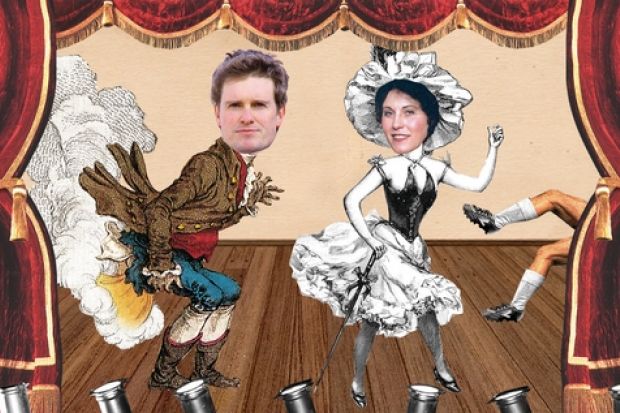"Are we happy?" Marie Lloyd asked her audience. "Yes we are," came the resounding reply. That's not an exchange you can imagine between the England football team and their fans. But I don't want to talk about that. Rude Britannia (BBC Four, Monday 14 June, 9pm) was much more entertaining. This was the second of three programmes looking at how Britons bare their behinds at polite society. The offence to decency was depicted throughout by a cardboard woman shrieking and spilling tea.
There were lots of anecdotes but very little analysis. There was, for instance, no acknowledgement of the process by which the middle class move from condemning working-class pleasures to conniving with them in documentaries such as this while continuing to excoriate the excesses of contemporary culture. Tristram Hunt led the way in stating the obvious. Victorian Britain was "a new civilisation that the world hadn't seen before". And for the working class, it was a pretty deplorable one. Just like England's performance in fact, but I don't want to talk about that.
The Penny Gaffs provided some relief from the routine of the factory, with its poor pay, pollution and strict discipline. They were noisy, smoky, boozy and most definitely bawdy. Anyone, explained Ann Featherstone, could set up as a performer, even if they weren't any good. A bit like Britain's Got Talent, I suppose. In case we hadn't been listening to Ann, Jad Adams popped up to remind us that Penny Gaffs were loud drinking dens where you were unlikely to hear conversations about John Stuart Mill. Gaffs. There's something about that word that reminds me of how England play football. But I don't want to talk about that.
It was from the Penny Gaffs that music halls evolved. "They were a threat to Victorian values," said Matthew Sweet. He, like the other talking heads, appeared amid a crowd of period faces. All very jolly. If Matthew had said they were an affront to middle-class morality it would have been more accurate. The music hall didn't challenge Victorian values, it merely expressed a different version of them. And while a performer like Lydia Thompson may have raised a few eyebrows by dancing in male clothing, she was as respectable as any Dickensian heroine (although she had more spirit). When Wilbur F. Storey, the owner of the Chicago Times, criticised her troupe for impropriety, she horsewhipped him at gunpoint. We could do with her sort in the England team. But I don't want to talk about that.
In an attempt to appease the middle class and even to attract them into the music hall, proprietors promised to control rowdiness and drunkenness. Officials kept a watchful eye on the audience, and performers were exhorted not make rude remarks about royalty or religion. Mindful of the warning, George Leybourne made sure his act contained only drink, sex and crime. His character, "Champagne Charlie", boasted of "rogueing and stealing" and going to see young ladies. He was the ally of the working class, the aristocrat who knew how to enjoy life, unlike the middle class counting their pennies instead of cultivating their passions. And who is to say which is right? Leybourne died without a farthing to his name. Not a fate likely to occur to our £100,000-a-week footballers. But I don't want to talk about that.
The most famous music-hall artist was, of course, Marie Lloyd. Her career was the subject of the diverting Miss Marie Lloyd: Queen of the Music Hall (BBC Four, Tuesday 15 June, 10.25pm). "No one's ever given me a rose before," she declared to Percy Courtney, her first husband and the man who promoted her career. An illusionist later made one disappear into thin air. A showman in a top hat looked at us knowingly. He kept appearing at key moments in Lloyd's life - a mysterious and unsettling figure whom we could see but the characters could not. Jessie Wallace played the great Marie as she had played Kat Slater in EastEnders, full of sound and fury. But she did achieve poignancy in her portrayal of the star's downfall as she stumbled round the stage straining to sing One of the Ruins that Cromwell Knocked About a Bit.
This song, like all the others, was chosen to reflect aspects of her life, just as Marie reflected back to her audience aspects of theirs. The music hall was genuine popular culture. It registered the experience of the working class in an idiom that was at once realistic, sentimental, defiant, resigned and, above all, humorous. Adorno said entertainment was a forgetting of suffering. No, it's a way of coping with it. Which brings us back to football. But I don't want to talk about that. Suffice to say, I'm not happy.
Register to continue
Why register?
- Registration is free and only takes a moment
- Once registered, you can read 3 articles a month
- Sign up for our newsletter
Subscribe
Or subscribe for unlimited access to:
- Unlimited access to news, views, insights & reviews
- Digital editions
- Digital access to THE’s university and college rankings analysis
Already registered or a current subscriber?
